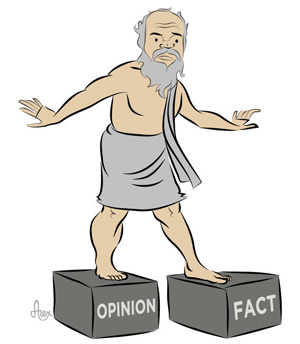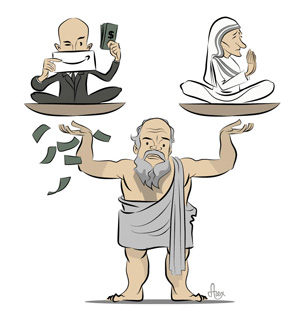
Your complimentary articles
You’ve read one of your four complimentary articles for this month.
You can read four articles free per month. To have complete access to the thousands of philosophy articles on this site, please
Ancient Greek Wisdom
The Wisdom of Ignorance
Daniel Silvermintz wants us to rediscover the virtue of Socratic ignorance.
Ignorance may be bliss, but that doesn’t mean we should celebrate stupidity. Ignorance has never been a good excuse, but it is even less so today, when anyone with a question can simply google an answer. How much more do we expect of our experts when even a schoolchild has access to the vast storehouse of human knowledge? Even in this age of participation trophies, we would be shocked if the Nobel committee decided to award a prize to a team of scientists whose research was a complete failure, regardless of how many years they’d worked on it. The case is, however, quite different in philosophy, where Socrates (470-399 BC) is celebrated for an odd claim to fame: “The one thing I know is that I know nothing.” Why in the world would we continue to venerate Socrates as one of the greatest thinkers in the history of philosophy when he admits to being a complete ignoramus?
We should, of course, keep in mind that Socrates’ ignorance did not go over so well with his contemporaries. They were so frustrated by his philosophical investigations that they sentenced him to death. During his trial Socrates claims that he pursued wisdom at the expense of all his other responsibilities, and he appeals to his poverty as a validation of his professional integrity. Callicles, one of Socrates’ most ruthless critics, was less than impressed by this attempt at defending the philosophic life: “When I see philosophy in a young lad I approve of it,” begins Callicles, before unleashing his rebuke, “But when I see an elderly man still going on with philosophy and not getting rid of it, that is the gentleman, Socrates, whom I think in need of a whipping” (Plato, Gorgias 485c-d).
Although relatively few individuals in Athens were engaged in studying philosophy, everybody in the city seems to have known about Socrates. When the comic playwright Aristophanes wanted to lampoon scientific thinking in his play Clouds, he depicted Socrates as an absent-minded professor conducting preposterous experiments: his student reports that the master was trying to figure out whether a gnat hums through his mouth or through his anus. The play opens with the country bumpkin Strepsiades trying to convince his good-for-nothing son Phidippides to better himself by enrolling at Socrates’ Academy. “I know that lot!” exclaims Phidippides in disgust, “Sly, shifty bastards! Anaemic, barefooted fools, like that Socrates and his mate, that Chaerephon guy! Bundles of misery and nothing else” (Clouds 103).
Socrates’ reputation appears to have extended far beyond his home in Athens. Plato preserves the encounter between Socrates and the young and ambitious military leader Meno, who hailed from the neighboring city state of Thessaly. Having studied with other famous intellectuals, notably the Sophist Gorgias, Meno appears to have sought out Socrates for advice regarding how he might best achieve what the Greeks called arête, which we can translate either as ‘success’ or ‘virtue’. “Can you tell me, Socrates,” inquires Meno, “whether arête can be taught, or is acquired by practice, not teaching?”(Plato, Meno 70a). Rather than answering the young man’s question, Socrates argues that we must know what ‘success’ means before we can figure out how to achieve it. After all, one would need a quite different gameplan depending on whether one was striving to be like Amazon founder Jeff Bezos or Mother Theresa. Meno’s question presumes that he already has a good idea of what success entails – which turns out to have more in common with amassing money and power than helping the poor and needy. Socrates, however, admits that he is completely clueless about the subject: “I have to reproach myself with an utter ignorance about virtue” (71b). Meno is shocked by this response, given Socrates’ reputation for wisdom. “But is it true, Socrates,” Meno retorts in disbelief, “that you do not even know what virtue is? Are we to return home with this report of you?” (71c).

Why would Socrates’ admission of ignorance provoke such moral outrage in Meno? Certainly Meno would excuse Socrates’ ignorance regarding a whole range of subjects; however, one might expect everybody to know what it means to be a good person. Even the Sophist Protagoras (490-420 BC), who was notorious for promoting unethical ideas among his students, was more judicious about professing his ideas publically: “Everyone, they say, should profess to be just, whether he is so or not, and whoever does not make some pretension to justice is mad,” (Plato, Protagoras 323d). Socrates not only professes his own ignorance, he goes even further by insisting that he has never met anyone who knows the meaning of ‘virtue’. With this casual aside, Socrates not only dismisses his contemporaries, but his entire civilization. Stories about heroes such as Achilles were not merely captivating entertainment for the Greeks, they presented role models for the cultural formation of the next generation of warriors and statesmen. Once again it is Protagoras who reminds Socrates that he should know better, since every schoolchild can recount the deeds of the great men of the past: “The children, when they have learnt their letters… are furnished with works of good poets to read as they sit in class, and are made to learn them off by heart,” replies Protagoras; “Here they meet with many admonitions, many descriptions and praises and eulogies of good men in times past, that the boy in envy may imitate them and yearn to become even as they” (325e). How then can Socrates say that he has no clue what it means to be virtuous, when he has, along with all his countrymen, been raised on the works of the poets?
We begin to see how Socrates’ declaration of ignorance could get him into a lot of trouble. Despite testimony that he observed traditional Greek religious rituals, the charge brought against him by the Athenian court was that he held unorthodox beliefs: “Socrates is a wrongdoer,” reads the indictment, “because he corrupts the youth and does not believe in the gods the state believes in, but in other new spiritual beings” (Plato, Apology 24b-c). Socrates responds to the charges by arguing that far from being sacrilegious he has been on a mission from god. He testifies before the court that the oracle at Delphi had told his friend Chaerephon that Socrates was the wisest man in the world. Socrates then reports that he devoted the rest of his life to investigating others to see if he could find someone wiser (whether out of humility, or the pride of disproving the god he doesn’t say). In the end, Socrates confirms the oracle and declares himself the wisest man in the world, since he is the one person who admits his own ignorance. “I am wiser than this man,” as Socrates says of one of Athens’ respected politicians, “for neither of us really knows anything fine and good, but this man thinks he knows something when he does not, whereas I, as I do not know anything, do not think I do, either” (Apology 21d).
Socrates’ claim to be doing the god’s work didn’t go over so well with the jury, who were less than impressed by his boastful claim to know nothing, and even less by his attempt to make others look like fools. They found him guilty; but offered him a last chance to redeem himself by telling the court what would be an adequate punishment to fit his crimes. In his final act of protest, Socrates suggested that he be celebrated for his intellectual labors in the same manner as an victorious athlete at the Games: “What, then, does such a man as I deserve?” asked Socrates indignantly: “There is nothing, men of Athens, so fitting as that such a man be given his meals [free for life] in the Prytaneum. That is much more appropriate for me than for any of you who has won a race at the Olympic Games with a pair of horses!” (Apology 36d). The jury was not amused by Socrates’ proposed punishment and sentenced him to death by drinking hemlock. However, not long after his death, the Athenians realized that they had wrongfully convicted him. History has further vindicated Socrates’ good name. But the question remains – why should we venerate someone on account of his ignorance?

In Plato’s dialogues we are the beneficiaries of a few thousand pages that preserve, with more or less fidelity, Socrates’ conversations with his contemporaries. Over and over again Socrates declares that he knows nothing about the subject he and his companions are discussing. An extraordinary passage among those thousands of pages has preserved one of the few occasions in which Socrates affirms something he claims to know with absolute certainty: “that there is a difference between right opinion and knowledge is not at all a conjecture with me but something I would particularly assert that I knew: there are not many things of which I would say that, but this one, at any rate, I will include among those that I know” (Meno 98b). Mistaken for a fool or a moral reprobate, Socrates’ profession of ignorance was actually a provocative way to get people to think about the distinction between an opinion (which can often be wildly misguided) and a logically proven claim. In other words, Socrates may have had many good opinions, but he realized that this could not serve as the basis for wisdom.
Even though there were philosophers who preceded him, Socrates is the true founder of the Western philosophical tradition because he was the first to investigate human affairs scientifically. “Socrates was the first to call philosophy down from the heavens,” writes the Roman statesman Cicero about his monumental achievement, “and compel it to ask questions about life and morality” (Tusculan Disputations 5.10-11).
Many people still regard ethics merely as a matter of opinion. A 2015 study conducted by the Barna Research Group reports that 74% of millennials agreed with the statement: ‘Whatever is right for your life or works best for you is the only truth that exists’ (‘The End of Absolutes: America's New Moral Code’ barna.com). In contrast, Socrates staunchly believed that human affairs are governed by absolute principles and thus can be investigated like other fields of knowledge. Despite devoting his entire life to these studies, he was forced to recognize the limits of his knowledge. But just as cancer research will not stop until it finds a cure, we must continue the work that Socrates initiated, for no other reason than our lives depend on it. “The duty of inquiring after what we do not know,” charges Socrates to future generations in the Meno (86b), “will make us better and braver and less helpless than the notion that there is not even a possibility of discovering what we do not know.”
© Daniel Silvermintz 2020
Daniel Silvermintz is Associate Professor of Philosophy at the University of Houston, Clear Lake. His book on the founder of the Sophist movement, Protagoras: Ancients in Action, was published by Bloomsbury Academic in 2016.









